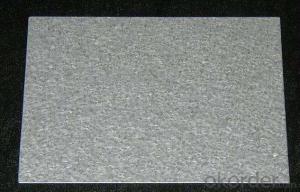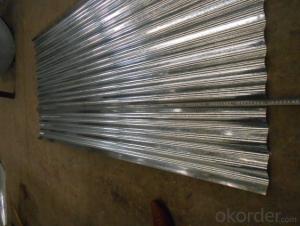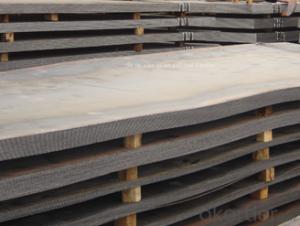Gavalume steel sheet
- Loading Port:
- China Main Port
- Payment Terms:
- TT OR LC
- Min Order Qty:
- -
- Supply Capability:
- -
OKorder Service Pledge
OKorder Financial Service
You Might Also Like
Standard | GB/T14978, ASTM A792M, JIS G3321, EN10215, etc |
Grade | DX51D-AZ, DX53D-AZ, SGLCC, SS255-550, etc |
Thickness | 0.35-2.3mm |
Width | 600-1270mm |
Inner Diameter | 508mm |
AZ Coated | AZ 50-200 |
Coil Weight | 12Tons max |
Technology | hot dip aluminum and zinc |
Post-processing | Chromated, Anti-finger printed, Oiled, etc |
a.) Construction: roof, walls, garage, soundproof walls, pipes and combined house, etc.
b.) Car: muffler, exhaust pipe, wiper accessories, fuel tanks, truck boxes, etc.
c.) Appliance: refrigerator backplane, gas stove, air conditioner, microwave, LCD border CRT explosion-proof belt, LED backlight, electrical cabinets, etc.
d.) Farm: pigsty, henhouse, granary, greenhouse with pipes etc.
e.) Other: broken thermal insulation cover, heat exchanger, dryer, warm water device, etc.
- Q:Are the steel sheets resistant to impact or bending?
- In general, steel sheets display resistance to both impact and bending. Steel possesses exceptional strength and durability, rendering it less susceptible to external forces like impacts or bending. This is attributed to the material's capacity to absorb and disperse applied energy, leading to minimal deformation or harm. Nevertheless, the extent of resistance to impact and bending may fluctuate based on factors such as sheet thickness, steel type, and any supplementary treatments or coatings that have been applied.
- Q:How are steel sheets cleaned and maintained?
- There are various methods available for cleaning and maintaining steel sheets, depending on specific requirements and conditions. Below are some commonly used approaches: 1. Regular cleaning: It is important to clean steel sheets regularly to eliminate dust, dirt, and other debris that may accumulate on the surface. This can be accomplished by using a soft cloth or sponge along with mild soap or detergent and warm water. It is advisable to avoid abrasive cleaners or scrub brushes that can cause surface scratches. 2. Rust removal: Prompt removal of rust spots is crucial to prevent further corrosion on steel sheets. Rust can be eliminated using a wire brush, sandpaper, or a rust remover solution. Once removed, the area should be thoroughly cleaned and dried. 3. Protective coating: Applying a protective coating can help prevent rust and corrosion, especially for steel sheets exposed to harsh environments or moisture. Coating options include paint, varnish, or specialized anti-corrosion coatings. The coating should be applied in accordance with the manufacturer's instructions and reapplied periodically as needed. 4. Proper storage: To prevent moisture buildup and corrosion, it is important to store steel sheets in a dry and well-ventilated area. They should be kept away from direct contact with the ground and other metals to avoid galvanic corrosion. Additionally, using covers or protective wraps can provide further protection against dust and other contaminants. 5. Periodic inspection: Regularly inspecting steel sheets for any signs of damage, such as dents, scratches, or cracks, is essential. If any damage is identified, it should be promptly repaired to prevent further deterioration. 6. Professional maintenance: In the case of large-scale or complex steel sheet installations, it may be necessary to enlist professional maintenance services. These experts possess the knowledge, tools, and experience required to perform more extensive cleaning, maintenance, and repairs. By adhering to these cleaning and maintenance practices, steel sheets can maintain their integrity, appearance, and performance over time.
- Q:Are steel sheets suitable for roofing systems?
- Yes, steel sheets are suitable for roofing systems. Steel is a durable and long-lasting material that offers excellent protection against the elements. It is resistant to fire, rot, and pests, making it a popular choice for roofs. Additionally, steel sheets are lightweight, easy to install, and require minimal maintenance, making them an ideal option for roofing systems.
- Q:Can steel sheets be used in high-temperature applications?
- Yes, steel sheets can be used in high-temperature applications. Steel is known for its excellent heat resistance and can withstand high temperatures without losing its structural integrity. The specific type of steel and its composition play a crucial role in determining its suitability for high-temperature applications. Certain types of steel, such as stainless steel or heat-resistant steel, are specifically designed to withstand extremely high temperatures and are commonly used in industries such as aerospace, automotive, and manufacturing. These steel sheets can be utilized in various high-temperature environments, including furnaces, boilers, exhaust systems, and heat exchangers, among others. However, it is important to consider factors such as the specific temperature range, duration of exposure, and any potential corrosive elements present in the high-temperature environment to ensure that the chosen steel sheet is appropriate for the application.
- Q:Are the steel sheets corrosion-resistant?
- Yes, steel sheets can be corrosion-resistant depending on the type of steel used and the protective coating applied. Stainless steel sheets, for example, are known for their excellent corrosion resistance due to the presence of chromium that forms a passive protective layer on the surface. Additionally, galvanized steel sheets are coated with a layer of zinc, which acts as a sacrificial barrier to protect the underlying steel from corrosion. Other types of steel sheets can also be made corrosion-resistant through the application of coatings or treatments such as painting, powder coating, or plating. Therefore, it is important to consider the specific type of steel and any additional protective measures taken to determine the corrosion resistance of steel sheets.
- Q:Can steel sheets be used for solar panel manufacturing?
- Solar panel manufacturing can utilize steel sheets. Steel is a versatile material widely used in various industries, including renewable energy. It offers several advantages for manufacturing solar panels. To begin with, steel is a strong and durable material that provides structural integrity to solar panels. It can withstand harsh weather conditions and protect the delicate photovoltaic (PV) cells within the panels. This durability ensures longer lifespan for the panels, reducing maintenance and replacement costs. Additionally, steel sheets can be easily shaped and sized to meet the specific requirements of solar panel designs. This flexibility in manufacturing allows for the creation of efficient and visually appealing solar panels. Moreover, steel is a cost-effective option compared to alternatives such as aluminum or glass. It is readily available and has relatively low production costs, making it an economical choice for solar panel manufacturing. Nevertheless, it is important to note that steel sheets used in solar panel manufacturing are typically coated with protective layers to enhance their resistance to corrosion and prevent any negative impact on the PV cells. These coatings safeguard the steel from environmental factors like moisture or chemicals, ensuring the longevity and performance of the solar panels. In conclusion, steel sheets are indeed suitable for solar panel manufacturing due to their durability, versatility, cost-effectiveness, and ease of fabrication. When appropriately coated, steel provides a dependable and efficient solution for producing solar panels, thereby contributing to the growth of the renewable energy sector.
- Q:What is the minimum order quantity for the steel sheets?
- The minimum order quantity for the steel sheets is 100 units.
- Q:How do you prevent rusting on steel sheets?
- To prevent rusting on steel sheets, there are various effective measures you can implement: 1. Implement Protective Coatings: Create a barrier between the steel surface and the surrounding environment by applying protective coatings like paint, enamel, or powder coating. These coatings act as shields that guard against moisture and oxygen, thus preventing rust formation. 2. Utilize Galvanization: Coat the steel sheets with a layer of zinc through the process of galvanization. Zinc is highly resistant to corrosion and serves as a sacrificial anode, safeguarding the steel underneath. This method is commonly employed for outdoor applications where steel is exposed to moisture and harsh weather conditions. 3. Ensure Proper Storage: It is vital to store steel sheets in a dry and well-ventilated area to prevent rust formation. Moisture and humidity play significant roles in rust development, so it is essential to keep the sheets away from damp or wet environments. Additionally, storing the sheets off the ground on pallets or racks can help avoid contact with moisture. 4. Practice Regular Cleaning and Maintenance: Consistently clean the steel sheets with mild detergent and water to eliminate dirt, debris, or corrosive substances that may lead to rusting. After cleaning, thoroughly dry the sheets to prevent moisture accumulation. 5. Employ VCI (Volatile Corrosion Inhibitor) Packaging: During storage or transportation, employ VCI packaging materials such as VCI paper or film to effectively prevent rust on steel sheets. VCI emits corrosion-inhibiting molecules that form a protective layer on the steel surface, thus preventing rust formation. 6. Avoid Water Contact: Steer clear of prolonged exposure of steel sheets to water or other corrosive liquids. If the sheets come into contact with water, it is essential to promptly and thoroughly dry them to prevent rusting. By adhering to these preventive measures, you can significantly mitigate the risk of rust formation on steel sheets, ensuring their long-term durability and performance.
- Q:What is the difference between zinc-coated and zinc-aluminum coated steel sheets?
- Zinc-coated and zinc-aluminum coated steel sheets are both types of steel that have been treated with a protective layer of zinc. However, there are some differences between the two processes that result in different characteristics and performance. Zinc-coated steel sheets, also known as galvanized steel sheets, are created by immersing the steel sheets in a bath of molten zinc. This process forms a layer of pure zinc on the surface of the steel, creating a barrier that protects the steel from corrosion. The zinc layer is typically applied evenly across the entire surface of the steel sheet. On the other hand, zinc-aluminum coated steel sheets, also known as galvalume or Aluzinc steel sheets, are created by coating the steel sheets with a mixture of zinc and aluminum. This coating is applied using a hot-dip process, similar to that used for zinc-coated steel sheets. The presence of aluminum in the coating provides enhanced corrosion resistance compared to pure zinc coatings. The key difference between zinc-coated and zinc-aluminum coated steel sheets lies in their performance and durability. Zinc-coated steel sheets are effective in protecting the steel from corrosion in most atmospheric environments. However, in more aggressive or severe environments, such as those with high humidity or exposure to saltwater, zinc-coated steel may not provide sufficient protection and can corrode over time. Zinc-aluminum coated steel sheets, on the other hand, offer superior corrosion resistance due to the presence of aluminum in the coating. The aluminum acts as a sacrificial anode, which means it corrodes preferentially to the steel, protecting it from corrosion. This makes zinc-aluminum coated steel sheets more suitable for environments where corrosion is a significant concern, such as coastal areas or industrial settings. In summary, while both zinc-coated and zinc-aluminum coated steel sheets provide a protective layer of zinc, zinc-aluminum coated sheets offer improved corrosion resistance due to the presence of aluminum. Therefore, zinc-aluminum coated steel sheets are generally preferred in more aggressive or corrosive environments, while zinc-coated steel sheets are suitable for most atmospheric conditions.
- Q:Can steel sheets be used for kitchen backsplashes?
- Yes, steel sheets can be used for kitchen backsplashes. Steel is a durable and easy-to-clean material, making it a suitable choice for a kitchen backsplash application.
1. Manufacturer Overview |
|
|---|---|
| Location | |
| Year Established | |
| Annual Output Value | |
| Main Markets | |
| Company Certifications | |
2. Manufacturer Certificates |
|
|---|---|
| a) Certification Name | |
| Range | |
| Reference | |
| Validity Period | |
3. Manufacturer Capability |
|
|---|---|
| a)Trade Capacity | |
| Nearest Port | |
| Export Percentage | |
| No.of Employees in Trade Department | |
| Language Spoken: | |
| b)Factory Information | |
| Factory Size: | |
| No. of Production Lines | |
| Contract Manufacturing | |
| Product Price Range | |
Send your message to us
Gavalume steel sheet
- Loading Port:
- China Main Port
- Payment Terms:
- TT OR LC
- Min Order Qty:
- -
- Supply Capability:
- -
OKorder Service Pledge
OKorder Financial Service
Similar products
New products
Hot products
Related keywords






























